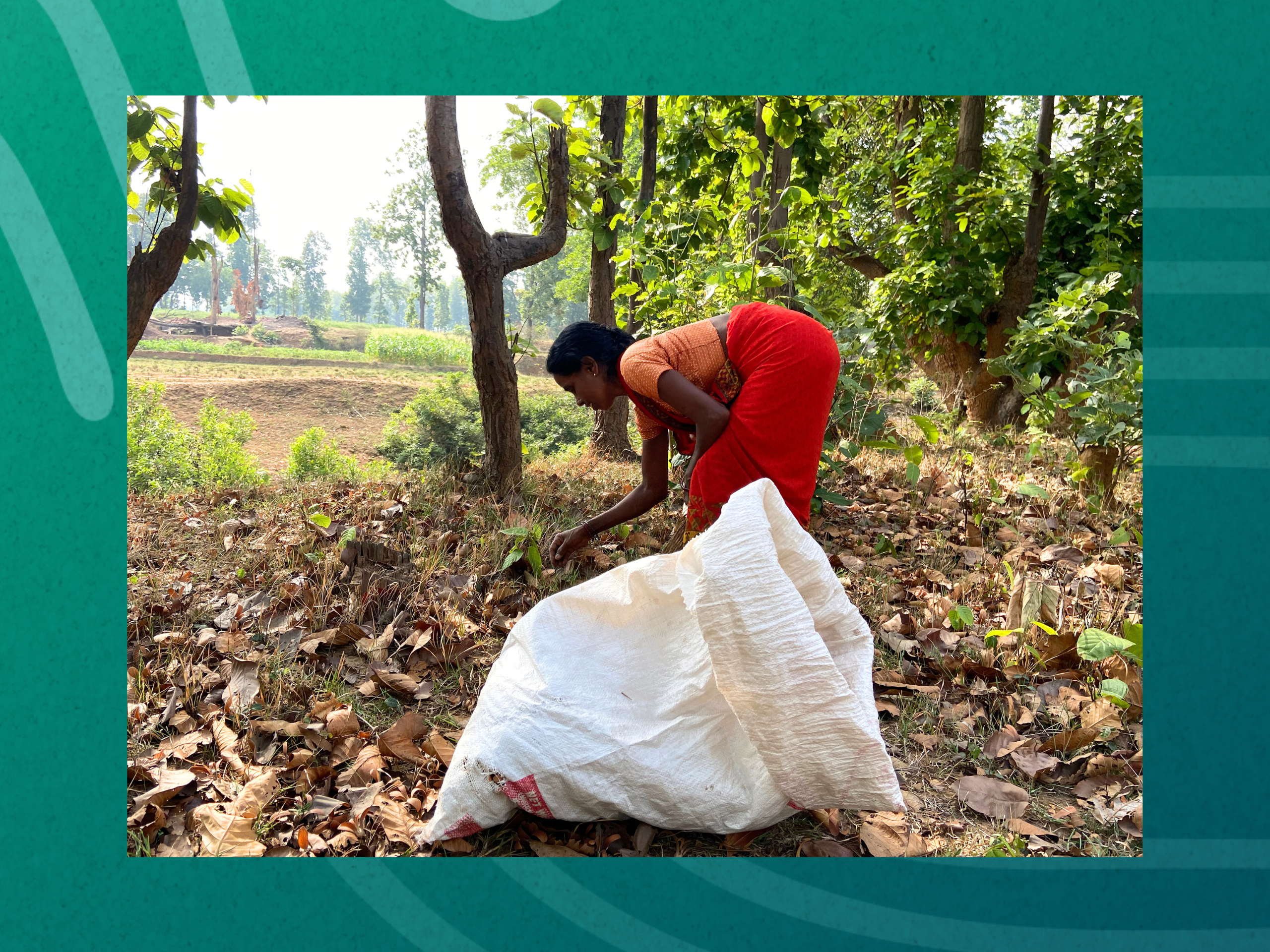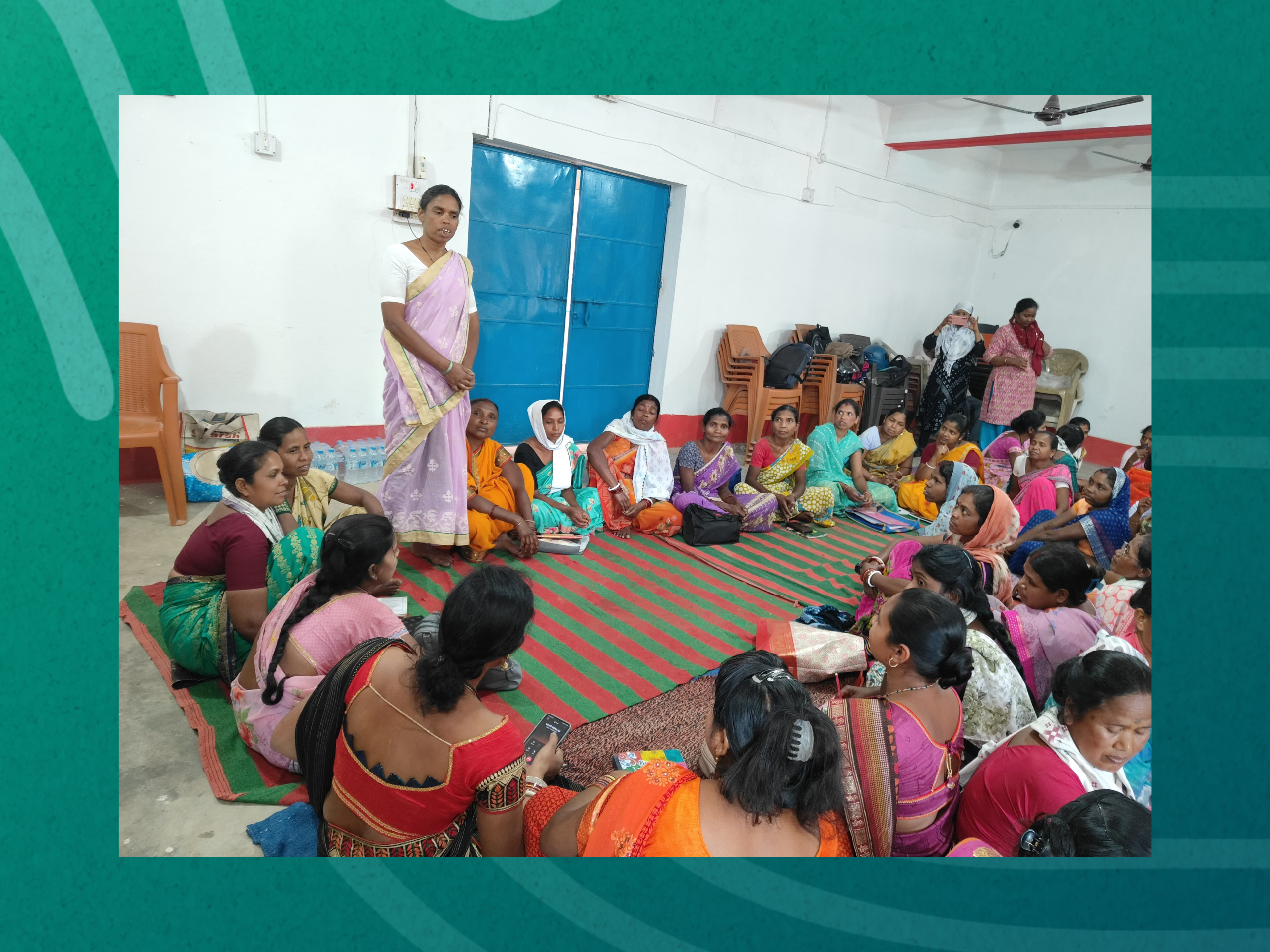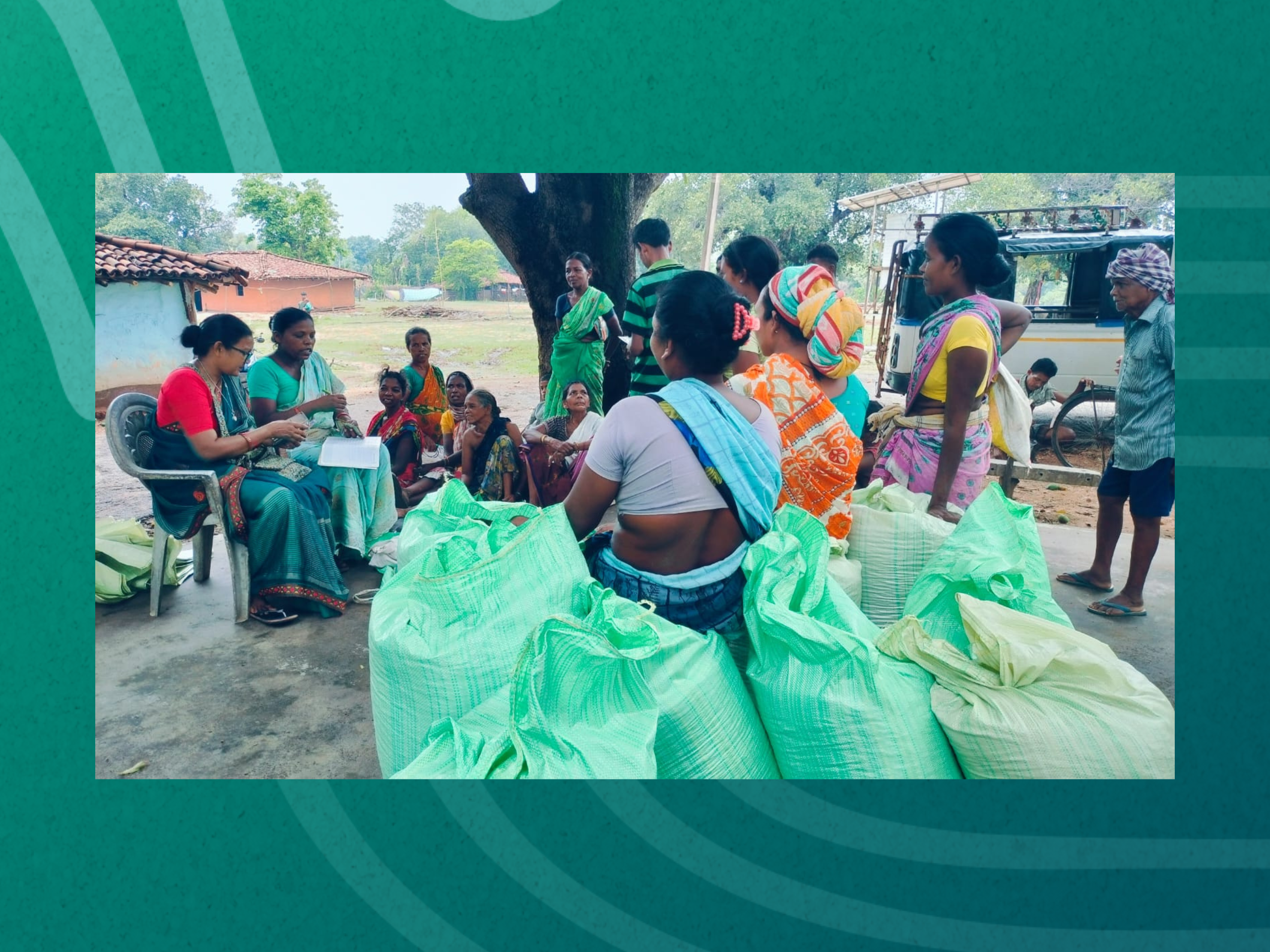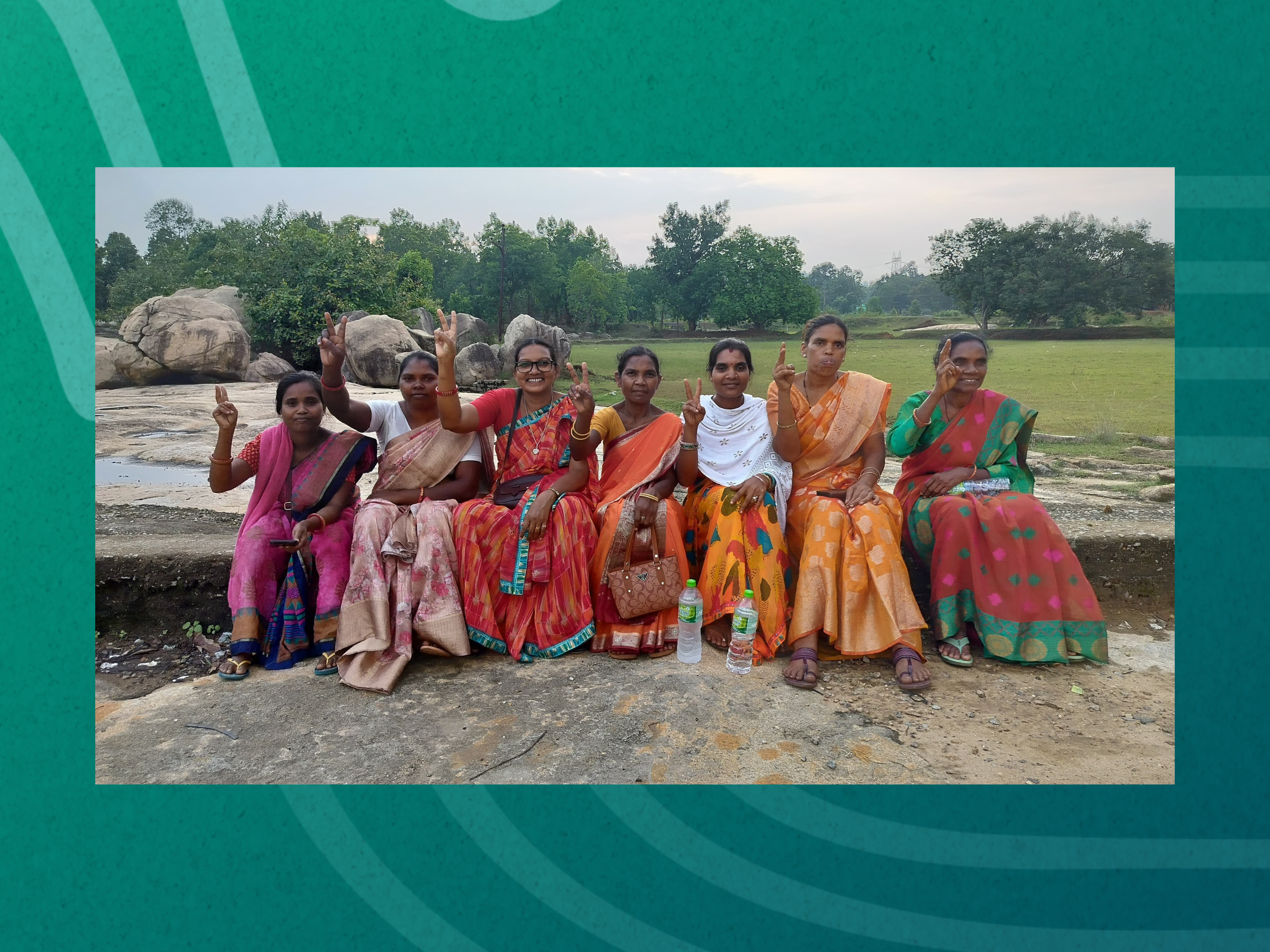2025-11-28
By Arushi Jha Thakur
In the deep forests of Simdega, in the southwest corner of the state of Jharkhand, India, women have long been the invisible backbone of the forest economy. For generations, tribal women have collected sal seeds (Shorea robusta), tendu leaves, and mahua flowers—forest produce that sustains their families but rarely secures their future.
“Sal seeds are more than just a source of livelihood; they denote our traditional way of life,” says Biswaji Jojo, a primary sal seed collector from Simdega.
Sal seeds are in high demand worldwide. They are prized for their oil and shea butter–like properties, used in chocolate, cosmetics, and perfumes. Yet, despite this demand, women of Simdega often earn only subsistence wages. Each woman typically collects just a few kilos, selling them to middlemen who reap the profits. Without aggregation or direct access to markets, women’s labour is undervalued, their contribution invisible.
Now they’re breaking that cycle.

Tribal woman gathering forest produce in the Simdega forest.
In January 2025, over 1,000 women from 60 villages came together to form the Sona Buru Jungle Producer Company (SBJPC)—among Jharkhand’s first women-owned and managed forest enterprises. The company was built on the Sulabhaa Producer Company model, a blueprint developed by the Indian School of Business and the Bharti Institute of Public Policy for establishing women-owned and led producer companies. This blueprint guided everything from membership structure and board governance to compliance systems and business processes.
With a democratically elected Board of Directors, SBJPC represents a new model of leadership: women at the helm of business, community governance, and conservation. The journey to get here was long and demanding, involving months of groundwork, paperwork, and training to understand formal systems and build collective readiness.
With catalytic support from Bharti Institute of Public Policy’s Initiative on the Forest Economy, SBJPC registered as a formal company, became compliant with the Goods and Services Tax regime in India, opened a bank account, and set up its first office. This milestone came only after persistent effort and learning. What once seemed unimaginable—tribal women navigating business law, taxation, and industrial contracts—became reality.
SBJPC is more than a business. It is a platform for women’s voices in forest governance, a vehicle for equitable growth, and a model of sustainable resource management.

Sona Buru Jungle Producer Company gathering
In June 2025, SBJPC made its first direct industrial sale—44.5 tonnes of sal seeds for 1.43 million Indian rupees (approximately US$17,155)—to AAK India, a company that sells plant-based ingredients. FarMart, a major food commerce platform in India, served as the supply chain partner. It infused risk capital into SBJPC to enable the women to procure the sal seeds and sell them to AAK India. The Initiative on the Forest Economy team supported SBJPC by connecting the women with AAK India, an industrial buyer of sal seeds. Further, the team supported participating women to strengthen their financial literacy, leadership, business management, and sustainable resource use. It also coordinated aggregation, grading, bagging, transport, weighbridge checks, and documentation for Goods and Services Tax regime invoices.
By eliminating middlemen, SBJPC secured fairer prices, transparent benefit-sharing, and profit distribution. The deal also validated women’s collective capacity to deliver at the industrial scale—a milestone achieved only through steady organisation and countless days of work in the field and at collection centres.
“This is just the beginning,” says Subardani Lugun, SBJPC’s chairperson. “Our goal is to bring Simdega’s forest produce to the right markets. Many of these products are still sold informally and fetch unfair prices. Through a formal supply chain, we want to ensure fair value and connect directly with industries. This will help us achieve economic self-reliance and promote forest conservation.”
"This is just the beginning. Our goal is to bring Simdega’s forest produce to the right markets. Many of these products are still sold informally and fetch unfair prices. Through a formal supply chain, we want to ensure fair value and connect directly with industries. This will help us achieve economic self-reliance and promote forest conservation."

Women selling forest produce
Women are at the centre of community-managed forests in Simdega. When they lead, forest enterprises and entire communities benefit. Under favourable conditions, community-managed forests can alleviate poverty in forest-dependent communities. India’s legal framework supports this through the 2006 Forest Rights Act. Across India, over 7 million hectares of forest land have been titled under this legislation, which recognises both individual and community forest resource rights.
SBJPC’s model delivers:
Each of these outcomes has come after years of patient institution-building and negotiation with local businesses. With this first sale, Gram Sabhas received direct transfers to their bank accounts. They earmarked the funds for fire prevention, tree planting, and forest protection—ensuring conservation goes hand-in-hand with livelihood initiatives.

Women members of the Sona Buru Jungle Producer Company
SBJPC shows what’s possible when women are equipped with business tools and own their own company. The company aggregates women collectors into a cooperative capable of meeting industrial demand, addressing market barriers, and eliminating brokers. It systematises collection, storage, grading, packaging, and marketing, adding value to forest produce. SBJPC ensures collective ownership with an elected Board of Directors, delivering financial transparency and equitable benefit-sharing. Finally, through community forest resource management committees, it shares revenue from sales with Gram Sabhas to fund forest protection, fire prevention, grazing regulation, and tree planting.
The process has not been simple as scaling requires continued trust building and time. But SBJPC has charted a path others can follow. And with the right support, this path can scale—bringing dignity, equity, and sustainability to forest-dependent communities across India.
Arushi Jha Thakur is a research associate at the Indian School of Business, Bharti Institute of Public Policy
The Indian School of Business, including its think tank the Bharti Institute of Public Policy, is a long-term Tenure Facility partner engaged in mainstreaming tenure security as a core business consideration within forest-based supply chains in India. Tenure Facility’s support helps the school advance research, dialogue, and solutions that drive inclusive forest-based economic systems, strengthening forest governance while ensuring sustainable livelihoods and economic security for forest-dependent communities.
Articles